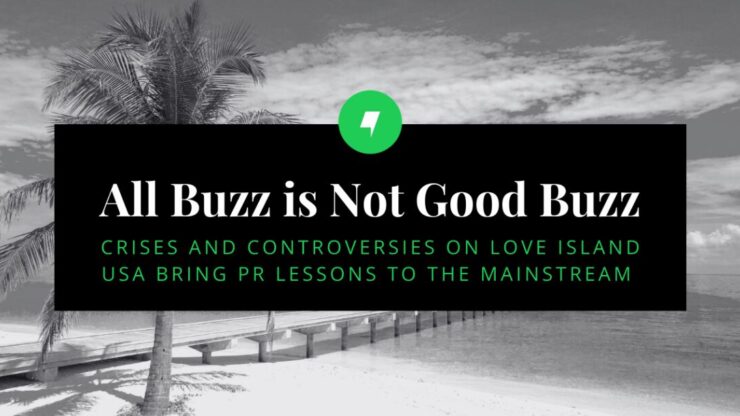Reality TV is supposed to be an escape — the kind of show you watch at the end of a long day for laughs, drama, and maybe a little romance. But when the drama shifts from the villa to real-life controversy, that escape can turn into a public relations nightmare. This summer, Love Island USA Season 7 proved that even the most binge-worthy shows aren’t immune to reputational damage.
For the Uninitiated: What is Love Island?
Love Island is a dating reality show where singles, called “islanders,” live in a villa and couple up in hopes of finding romance and winning a cash prize. New episodes premiere five out of seven days of the week, allowing viewers to watch romance, unexpected twists, and the social dynamics between contestants unfold in real time. Viewers also have the power to weigh in on eliminations throughout the show and get to choose the winning couple. The U.S. version, now in its seventh season, is adapted from the hit U.K. show and relies heavily on social media buzz to drive its cultural relevance.
The formula is simple: put attractive, charismatic people together in a high-stakes environment and see what unfolds. For viewers, the purpose is pure entertainment, but the relationships, conflicts, and personal stories often feel real enough that audiences form deep emotional connections with contestants. That’s why scandals don’t just fade away; they leave lasting impressions on the contestant’s reputation and the show’s brand.
When Casting Becomes a PR Problem
Dating back to the first reality TV shows like The Real World and Survivor, casting aims to bring in diverse, dynamic personalities. Today, the stakes are higher than ever in the age of social media. This season, several contestants faced backlash when viewers uncovered offensive language, controversial posts, and questionable past behavior.
Islander Cierra Ortega’s removal became one of the most visible. Her Instagram account was run by a friend during her time on the show, and after a little over three weeks in the villa, old posts featuring slurs resurfaced online, sparking criticism and prompting her removal. She wasn’t the only one to face scrutiny this season, as another islander, Yulissa Escobar, was removed for past comments after two days in the villa.
From a PR perspective, it was reasonable to expect that the show would release an official statement addressing the recent removals of contestants. Instead, no communication was issued. This is not the first instance in which the franchise has encountered similar challenges, nor the first time it has opted to forgo public acknowledgment.
Ultimately, this is a preventable crisis. Just like brands plan for potential issues, reality TV shows also need to think long-term. The Love Island brand is now seven seasons deep in the U.S., with a global franchise dating back nearly a decade. Longevity requires foresight, and that means anticipating what issues could arise in our digital age, how audiences will react, and how to address the controversy that’s now associated with your brand.
Cyberbullying and the Mental Health Conversation
The season’s challenges didn’t stop at casting. During the show, on-camera arguments between the girls and the elimination of islanders Chelley Bissainthe and Jeremiah Brown fueled online bullying from fans, prompting Love Island USA to post a statement urging viewers to be kind. But the response? A short, generic Instagram slide, which felt weak and performative to many fans.
From a PR perspective, this was a missed opportunity. Silence wasn’t an option (ignoring the harassment would have been worse), but when speaking up, your words must be meaningful. A vague, one-size-fits-all plea isn’t enough to protect contestants or address the culture of harassment surrounding the show.
Sadly, this isn’t a new issue for Love Island. Across the franchise, contestants have spoken out about mental health struggles after the show, and tragically, some have committed suicide. The brand has implemented certain mental health protocols, but this season’s delayed, lackluster response towards hate shows a lack of preparation that prevents them from effectively addressing the root problem.
For their contestants’ well-being and audience retention, Love Island would be better suited if they found a balance between letting commentary fuel the show’s promotion and maintaining a brand that doesn’t cause harm. One easy way they could prepare for these issues and potential backlash is scenario planning. This PR technique would help establish clear, effective strategies to support contestants’ well-being during and after the show.
PR Lessons for Reality TV
Crisis communications is more than reacting quickly, it’s about responding strategically. A rushed statement may check the “response” box, but if it lacks substance, it can do more harm than good.
The same is true in entertainment. A strong crisis response should:
- Prevent: Thoroughly vet cast members to avoid foreseeable issues.
- Prepare: Have adaptable plans for addressing public backlash and issues.
- Protect: Put the safety and well-being of the people at the center of the controversy first.
Quick and strategic responses rooted in authenticity, empathy, and action are ideal, as inconsistent messaging or empty words risk losing the audience’s trust and damaging the brand.
The PR Takeaway
The Love Island brand is built on audience engagement, but that engagement cuts both ways. Fans can be fiercely loyal or turn critical overnight. This season proved that “all press is good press” is a dangerous myth.
A fast, authentic, and value-driven response isn’t just a nice-to-have; it’s essential. Crisis communications in reality TV should follow the same principles as in business: prepare in advance for various situations, address the issue directly, show care for the people involved, and follow through with meaningful action. Anything less risks damaging reputations and relationships with the audience.
Posted In Crisis Communications, Media & Culture
 Rebecca Devine
Rebecca Devine 